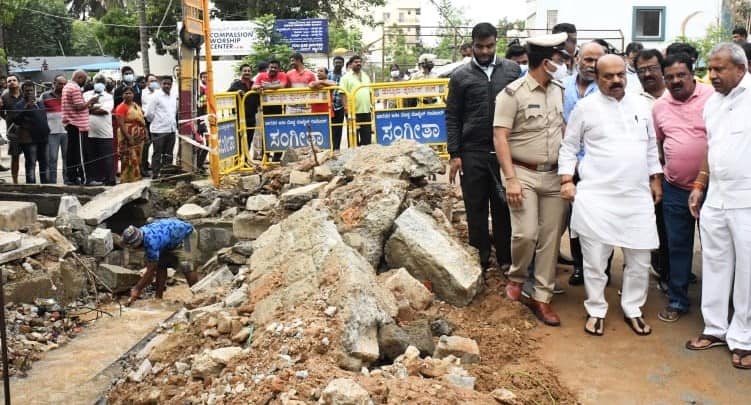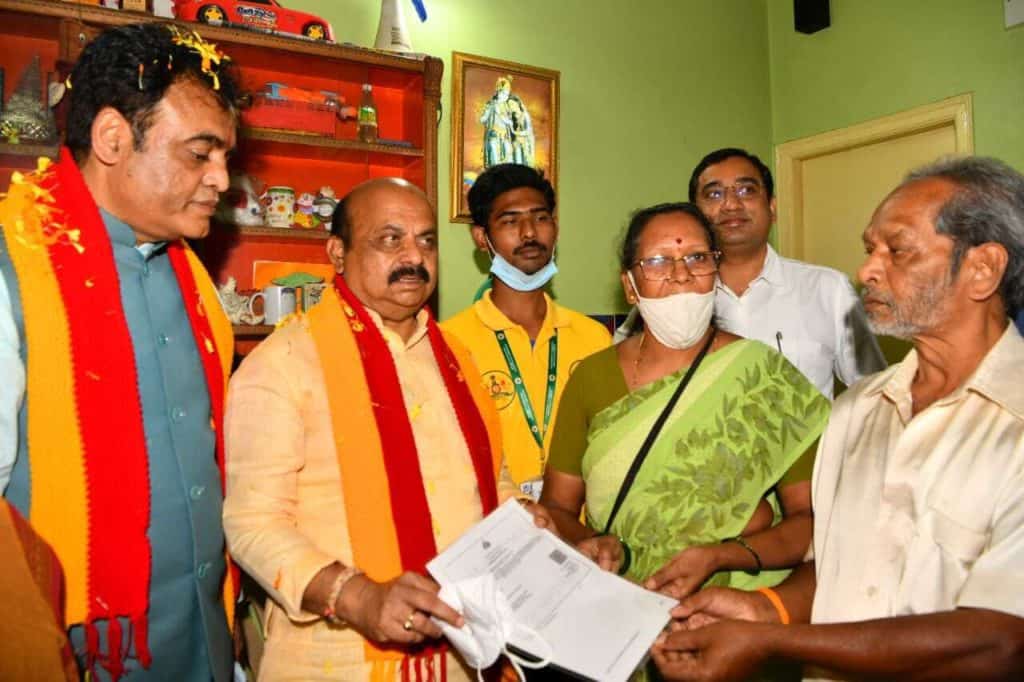World class cities don’t happen in one year. That’s as long as Basavaraj Bommai has been chief minister of Karnataka. Like his predecessors, Bommai too has retained the lucrative portfolio of Minister for Bengaluru Development, in which context he has spoken about making Bengaluru a world class city.
Bommai and his supporters, while celebrating his first anniversary as CM on July 28th, mentioned the many promises he has made in taking Bengaluru towards that goal. None of them are very different from what his predecessors had promised. Neither is the city any better off today than it was one year, five years or even ten years back.
If anything, Bengaluru is probably worse off, especially if one is to go by the flooding that happens all over Bengaluru every time there is a heavy shower, as happened again in recent days. This also results in a complete breakdown of traffic management, which as it is has been unable to cope with the daily traffic congestion woes commuters face.
Big bucks for infra to little effect
Ever since he took over, Bommai has not been stingy in announcing big buck packages specifically to develop Bengaluru. Among his first promises, made last October, was a special package of Rs 6,000 crore for Bengaluru under the ‘Amruta Nagarothana’ scheme. This was in line with the practice of successive chief ministers announcing mega-packages for Bengaluru – like B S Yediyurappa’s Nava Nagarothana Yojane and H D Kumaraswamy’s Nava Bengaluru Yojane.
Bommai set aside an even larger amount, Rs 8,409 cr, for Bengaluru in the current year’s State budget. The emphasis was on projects for traffic de-congestion, which includes the long-pending suburban rail and Peripheral Ring Road (PRR) projects. It also included funds for development of roads, lakes, parks, slums, school construction and solid waste management, among other things. Bommai also promised that in six locations, the city’s Namma Metro stations would be connected with Indian Railways’ stations.
Read more: PRR: Massive environmental damage for another futile Ring Road?
Following up on this, Bommai announced in July that work on the 74-km PRR, which would form a third ring road around Bengaluru, would start this year. Pending for the past 15 years and dogged by controversy, few are convinced that the Rs 15000-crore project will actually take off this year. The first tender floated in March was cancelled after private companies cited lack of clarity on the costs they’d have to bear. Fresh tenders have been floated now. But government agencies have not been able to resolve farmers’ protests against the massive land acquisition needed for the project, or respond to environmental concerns.
The suburban rail project saw some progress when PM Modi laid the foundation stone in June. At the event, Modi announced that the project, pending for about 40 years, would be completed within 40 months. But work on it has not started yet.
Bommai also said satellite towns like Hoskote would be developed to de-congest Bengaluru.
Meanwhile, several infrastructure issues plaguing the city remain unsolved.
Despite the high number of pothole-related deaths, the quality of roads remain poor. As per this year’s BBMP budget document, the state government grants were to cover crores worth of road works. For example, the document mentioned Rs 605 cr for road development, Rs 201 cr for restoring roads in 110 peripheral villages, Rs 109 cr for developing ORRCA (Outer Ring Road Companies Association) roads, and so on.
Yet, residents in different parts of the city have been regularly protesting about the poor state of roads, and the High Court has been repeatedly pulling up BBMP on the pothole issue.

Poorly maintained stormwater drains that cause flooding across the city during rains is another issue that remains unresolved. In the aftermath of flooding in May, Bommai announced that stormwater drains would be developed at the cost of Rs 1,600 cr. According to him, road and drain development work in the city would be completed by November end.
Promises on healthcare, housing
Last month, Bommai announced that ‘Namma Clinics’, along the lines of AAP’s Mohalla Clinics in Delhi, will be opened in all 243 wards of Bengaluru in August. These clinics will be a tier below the PHCs, and will provide ward-level health services and reduce load on hospitals. Bommai also suggested that state health department officials start a separate health services division in Bengaluru, to keep pace with the city’s growth. A ‘brain health clinic’ was opened in Jayanagar General Hospital last month, under the Karnataka Brain Health Initiative that Bommai had announced in the budget.
In June, Bommai also announced that BBMP’s ‘Onti Mane’ housing scheme would be resumed soon. The scheme, which has been inactive these past few years, offers Rs 5 lakh aid to SC, ST, OBC and minority groups to build houses in their own plots. Soon after Bommai’s announcement, BBMP said they have identified 2,780 beneficiary families, and the project would cost Rs 139 cr.
Bommai government has been pushing for the long-pending Mekedatu reservoir project, to overcome Bengaluru’s water scarcity. But given the Karnataka-Tamil Nadu dispute over Cauvery water sharing, Centre has not yet given approval for the project.
Given the upcoming BBMP election, Bommai government has also been examining the possibility of issuing A khata certificates to B khata properties. In this case too, there has been no decision so far. (A khata is issued to legally-compliant properties, and B khata to illegal/irregular properties. Issue of A khata certificates to B khata properties wouldn’t mean these properties would get regularised; that’s a separate scheme known as Akrama Sakrama which is pending in court.)
Last November, Bommai inaugurated the Janasevaka programme in Bengaluru Urban district. Under the programme, citizens can avail 56 services, like issue of khata certificate and ration card, at their doorstep. Though the programme was piloted in Dasarahalli constituency during Yediyurappa’s tenure, it was extended to the entire district by Bommai.

Bommai’s projects largely seem to be a repetition of what earlier chief ministers had promised. As mentioned, work towards fulfilment of many of his promises are yet to even get started. It remains to be seen if these projects will really be completed within the deadlines Bommai mentioned.
Increasing religious polarisation
While several issues of communal polarisation rocked the State during Bommai’s tenure, impacts were felt in Bengaluru too. In the wake of the State’s hijab ban, some Bengaluru colleges saw arguments over the issue, and the city police banned protests around educational institutions.
After protests by Hindu right-wing organisations against azaan in mosques, the city police seized mics from various religious establishments. Other issues such as the dispute over Idgah Maidan ownership continue.
Delayed BBMP elections
The Bommai government too has shown little inclination to hold the BBMP Council elections. The term of the previous Council had ended in 2020. Without councillors or ward committee meetings, citizens are facing several difficulties in resolving ward-level issues, and local MLAs are exerting more control than usual on ward affairs. It was only after a recent Supreme Court order that the government took initiatives for ward delimitation and OBC seat reservation. Since these processes are yet to be concluded, it isn’t clear when the BBMP election would eventually be held.
Read more: BBMP elections: Major parties have ready promises, new ones talk citizen empowerment
With no elected councillors, Bommai set up a task force in May headed by a minister in each of the eight zones of BBMP. The task force was to include MLAs, MPs and BBMP engineers to monitor development work in the zone and take action in case of emergencies. Again, nothing much has actually changed on the ground for the people in these zones.
Clearly, decentralised governance of Bengaluru has been ignored by Bommai too.
They can’t complete a flyover. Forget Suburban Rail. Shivananda Flyover should be inaugurated by Joe Biden. So should Koramanagala Elevated Road and Majestic Grade Separator.